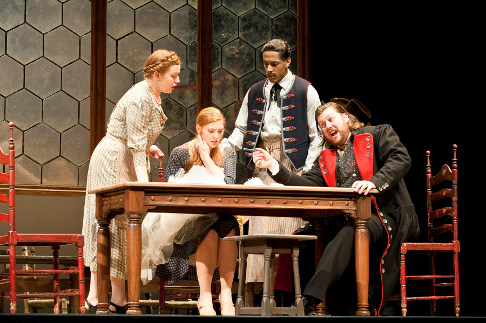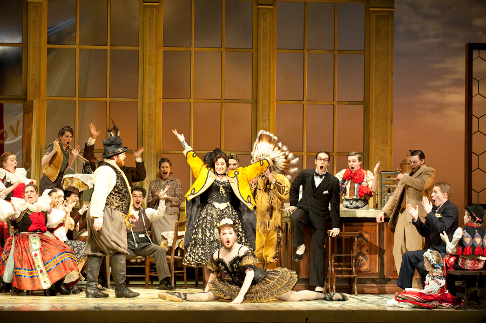Recently in Performances
English Touring Opera are delighted to announce a season of lyric monodramas to tour nationally from October to December. The season features music for solo singer and piano by Argento, Britten, Tippett and Shostakovich with a bold and inventive approach to making opera during social distancing.
This tenth of ten Live from London concerts was in fact a recorded live performance from California. It was no less enjoyable for that, and it was also uplifting to learn that this wasn’t in fact the ‘last’ LfL event that we will be able to enjoy, courtesy of VOCES8 and their fellow vocal ensembles (more below …).
Ever since Wigmore Hall announced their superb series of autumn concerts, all streamed live and available free of charge, I’d been looking forward to this song recital by Ian Bostridge and Imogen Cooper.
Although Stile Antico’s programme article for their Live from London recital introduced their selection from the many treasures of the English Renaissance in the context of the theological debates and upheavals of the Tudor and Elizabethan years, their performance was more evocative of private chamber music than of public liturgy.
Evidently, face masks don’t stifle appreciative “Bravo!”s. And, reducing audience numbers doesn’t lower the volume of such acclamations. For, the audience at Wigmore Hall gave soprano Elizabeth Llewellyn and pianist Simon Lepper a greatly deserved warm reception and hearty response following this lunchtime recital of late-Romantic song.
For this week’s Live from London vocal recital we moved from the home of VOCES8, St Anne and St Agnes in the City of London, to Kings Place, where The Sixteen - who have been associate artists at the venue for some time - presented a programme of music and words bound together by the theme of ‘reflection’.
'Such is your divine Disposation that both you excellently understand, and royally entertaine the Exercise of Musicke.’
‘And there was war in heaven: Michael and his angels fought against the dragon; and the dragon fought and his angels, And prevailed not; neither was their place found any more in heaven … that old serpent … Satan, which deceiveth the whole world: he was cast out into the earth, and his angels were cast out with him.’
There was never any doubt that the fifth of the twelve Met Stars Live in Concert broadcasts was going to be a palpably intense and vivid event, as well as a musically stunning and theatrically enervating experience.
‘Love’ was the theme for this Live from London performance by Apollo5. Given the complexity and diversity of that human emotion, and Apollo5’s reputation for versatility and diverse repertoire, ranging from Renaissance choral music to jazz, from contemporary classical works to popular song, it was no surprise that their programme spanned 500 years and several musical styles.
The Academy of St Martin in the Fields have titled their autumn series of eight concerts - which are taking place at 5pm and 7.30pm on two Saturdays each month at their home venue in Trafalgar Square, and being filmed for streaming the following Thursday - ‘re:connect’.
The London Symphony Orchestra opened their Autumn 2020 season with a homage to Oliver Knussen, who died at the age of 66 in July 2018. The programme traced a national musical lineage through the twentieth century, from Britten to Knussen, on to Mark-Anthony Turnage, and entwining the LSO and Rattle too.
With the Live from London digital vocal festival entering the second half of the series, the festival’s host, VOCES8, returned to their home at St Annes and St Agnes in the City of London to present a sequence of ‘Choral Dances’ - vocal music inspired by dance, embracing diverse genres from the Renaissance madrigal to swing jazz.
Just a few unison string wriggles from the opening of Mozart’s overture to Le nozze di Figaro are enough to make any opera-lover perch on the edge of their seat, in excited anticipation of the drama in music to come, so there could be no other curtain-raiser for this Gala Concert at the Royal Opera House, the latest instalment from ‘their House’ to ‘our houses’.
"Before the ending of the day, creator of all things, we pray that, with your accustomed mercy, you may watch over us."
The doors at The Metropolitan Opera will not open to live audiences until 2021 at the earliest, and the likelihood of normal operatic life resuming in cities around the world looks but a distant dream at present. But, while we may not be invited from our homes into the opera house for some time yet, with its free daily screenings of past productions and its pay-per-view Met Stars Live in Concert series, the Met continues to bring opera into our homes.
Music-making at this year’s Grange Festival Opera may have fallen silent in June and July, but the country house and extensive grounds of The Grange provided an ideal setting for a weekend of twelve specially conceived ‘promenade’ performances encompassing music and dance.
There’s a “slide of harmony” and “all the bones leave your body at that moment and you collapse to the floor, it’s so extraordinary.”
“Music for a while, shall all your cares beguile.”
The hum of bees rising from myriad scented blooms; gentle strains of birdsong; the cheerful chatter of picnickers beside a still lake; decorous thwacks of leather on willow; song and music floating through the warm evening air.
Performances
![Paul Appleby as Jenik and Layla Claire as Marenka. [Photo by Nan Melville courtesy of The Julliard School]](http://www.operatoday.com/5148Bride_0258c.png)
22 Feb 2011
The Bartered Bride, New York
In the mid-nineteenth century, every nationality that did not possess a
national state felt a need to prove itself, to square its shoulders and claim
nationhood with all the identifying marks of a nation: a language with a
literature, a tricolor flag, a national anthem extolling the people’s
stalwart character and the country’s landscape (inevitably the loveliest
in the world), a national theater and a national opera to be performed there.
The national opera was often based on national legends and national folk tunes;
when possible, national folk dances made an appearance.
Bedřich Smetana resolved to create the Czech national opera at a time
when Czech nationhood was subsumed in that of the Austrian Empire, and he chose
a legend about a Czech dynast. Scenes from this opera adorn the walls of the
National Theater in Prague, which was constructed at that time, to this day.
The opera is called Libuše (the name of the prophetess who
founded both Prague and the Czech royal house); it is rarely performed in the
Czech lands and obscure outside them. Instead, to both the Czechs and the rest
of the world, the national opera is Smetana’s light, merry Prodaná
Nevěsta, to the English-speaking world (for it is seldom given in
Czech here) The Bartered Bride. In this guise it has long been in the
category of occasional revivals, the overture almost too familiar (orchestras
love it for the rhythmic workout it gives the strings: it’s a charming
showoff piece). The Met and Juilliard chose it for the first of what one hopes
will become a tradition of collaborations between the Met’s Lindemann
Young Artists and the Juilliard opera program in their nifty little opera
theater, the Peter J. Sharp. The omens look good.
One did wonder, though, at the performance, what Smetana’s charming
folk opera was doing in a Central European café in doom-laden 1938? Was some
ideological point intended? Or (one sneered) was it just that they
couldn’t afford costumes of the proper era? A program note by director
Stephen Wadsworth cleared things up: No, they couldn’t afford a full
stage of fancy peasant costumes. He gets applause from me for not trying to
make some political point of this, and for clear storytelling though, as usual
with Wadsworth, it’s a bit fussy. Something is always going on,
people are always dancing outside the window when the action should focus on
one character’s solo distress. All the performers were expected to insert
bits of folk-dance into their arias, just to ground us in Czech-ness, which
they did with varying skill—but being able to dance credibly while
they sing is part of the skill-set evidently being taught the Lindemann
Young Artists at the Met. But I still can’t believe parents in Central
Europe in 1938 would dare to arrange a marriage for their daughter without
consulting her any more than they would today.
Opera translations into English come in at least four varieties: Risible,
unendurable, irritating and inaudible. Inaudible—ENO’s Wagner, for
example—is my favorite. Sandy McClatchy’s new version of
Bartered Bride (an opera I have never heard sung in Czech) was mildly
irritating: lots of false rhymes and false accents (the heroine’s name,
at least, should fall with the proper emphasis), but many of those attending
seemed to enjoy it and it was so clearly sung that surtitles should not have
been necessary. The stuttering Vašek got laughs from those who find
disabilities hilarious. (In Smetana’s day, no doubt, that was a larger
group.)
 Jennifer Johnson Cano as Ludmila, Layla Claire as Mařenka, Donovan Singletary as Krusina, and Jordan Bisch as Kecal
Jennifer Johnson Cano as Ludmila, Layla Claire as Mařenka, Donovan Singletary as Krusina, and Jordan Bisch as Kecal
Among the singers, slim, red-haired Layla Claire made the biggest impression
as Mařenka, the bartered bride. She is a talented, affecting actress,
both flirting and sorrowing, and her voice has a Central European sort of
vibrato and a winning, plangent smoothness and rose on occasion to an opulent
high C. Too, she worked her irritations out in dance steps that seemed
unusually well integrated into her character. Paul Appleby, as her Jeník,
displayed the several colors of his attractive tenor well, though he was
unattractively costumed and obliged to use precious breath dancing with rage.
Alexander Lewis had the part of Vašek, Jeník’s stuttering
half-brother, and his well-supported light, high tenor made a nice contrast
between the suitors; he also dances winningly and acts ably: a comic
scene-stealer. I see Rossini and Donizetti leading roles in his future. Jordan
Bisch was also an audience favorite in the buffo role of the pompous marriage
broker, Kecal. His perfect diction and command of blowhard nuance (Kecal thinks
he’s smarter than anybody, even when he loses the barter of the title)
were as enduring as his rounded low notes. Noah Baetge’s star turn as the
Ringmaster of a convenient carnival invasion was not vocally impressive, but
that was all right since his part is written to be upstaged by ridiculous
circus acts—the bearded “lady” ballerina and the
contortionist were particular crowd-pleasers. The four annoying parents who
clutter the plot proved their worth when they joined distraught Mařenka
for the quintet that was the evening’s vocal peak. James Levine conducted
the Juilliard Opera Orchestra, and the thrilling, rushing string writing gave
no problems and great delight.
John Yohalem

![Paul Appleby as Jenik and Layla Claire as Marenka. [Photo by Nan Melville courtesy of The Julliard School]](http://www.operatoday.com/5148Bride_0258c.png)

